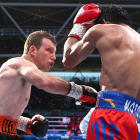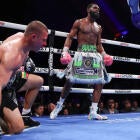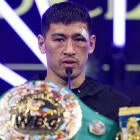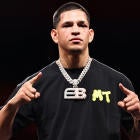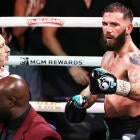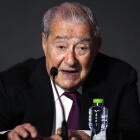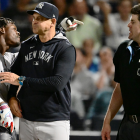There are plenty of words to describe unheralded Jeff Horn's unanimous decision over Manny Pacquiao on Sunday morning, from "stunning" and "exciting" to "outright wrong."
But despite the justified anger of those who preferred Pacquiao's cleaner shots and number of punches landed (nearly double, 182-92), Horn's upset in his hometown of Brisbane, Australia, was no robbery. Neither was Andre Ward's victory over Sergey Kovalev in their first fight last November, for that matter, despite the knee-jerk reactions created by such a subjective sport so infamous for impropriety.
If you want a real robbery, Pacquiao (59-7-2, 38 KOs) knows first-hand what that feels like. The decision he dropped to Timothy Bradley Jr. in their first 2012 meeting remains the most controversial among marquee fights this century. Horn-Pacquiao was simply a close and competitive fight in which the judges got the decision wrong.
In fact, outside of the 117-111 outlier -- the only scorecard of the three that could bare the label of possible larceny -- the pair of 115-113 scores in favor of Horn (17-0-1, 11 KOs) should be labeled more "generous" than "corrupt." And while you can certainly call them "wide," they still fit into the narrative of what actually took place inside the ring.
Regardless of whether you scored the battle on this night for Pacquiao (in full disclosure, I scored it 114-114), it's difficult to ignore the fact that Horn, 29, won the overall war. The massive underdog, without a signature victory to his name, backed up Pacquiao for 12 full rounds, outworked him and was awkward enough to at least give himself a chance to score an upset.
Let's not forget what this fight was supposed to be: a clear step down in competition for Pacquiao, 38, in hopes of resuscitating his weakened pay-per-view brand with a showcase victory in his first fight on cable since 2005, snapping an incredible 22-fight streak. In fact, most felt the matchup, against a limited and hard-charging opponent, offered Pacquiao his easiest shot at scoring his first knockout since 2009. And granted, that almost happened in Round 9.
But because of the generous decision, the narrative coming out of Saturday did nothing but bury the lede. While everywhere from social media to SportsCenter exploded the constant refrain of robbery (and how corrupt this broken sport continues to be), the real story was that Pacquiao finally got old.
A veteran of 60 professional fights and an incredible 22 years as a professional, boxing's only eight-division world champion is no longer elite. In fact, had he received the nod in a close decision against Horn instead of losing, it's a truth that ironically would've been easier to see.
It was Teddy Atlas, the legendary trainer and analyst for ESPN, who had the most salient point on this night when he essentially said, "Forget the Manny of 10 years ago, the Manny of five and even three years ago would've gotten this guy out of here." It wouldn't be out of line to take Atlas' point one step further.
One year ago, Pacquiao bounced back from a humbling defeat to Floyd Mayweather in their superfight by dominating both Bradley and then-welterweight titlist Jessie Vargas to make an outside run at fighter of the year consideration. Even that version of Pacquiao, at 37, would've likely used his speed and smarts to adjust earlier to Horn's awkward rhythm and make him pay for his aggression with fight-altering left hands.
But the old saying about father time being undefeated is unfortunately true. And for as much as Pacquiao was rightfully lauded in recent years as the rare legendary fighter so reliant upon speed and explosiveness to somehow retain those natural gifts so late in his career, even the Filipino icon wasn't immune.
Pacquiao bounced back from arguably the most physically devastating one-punch knockout in big-fight history against Juan Manuel Marquez five years ago and looked no worse for the wear. The only drawback to defeat for fans seemed to be Pacquiao's reliance upon boxing from the outside and using his speed in favor of mixing it up recklessly like in previous years.
But even that post-Marquez version of Pacquiao was largely gone on Saturday. Pac Man was a step slow from the opening bell and seemed to run out of gas after his only dominant round of the fight (the ninth), in which he nearly stopped Horn with clean left hands that left the Australian's face swollen and bloody.
Horn took home a victory and the WBO welterweight title, both of which most believe he didn't deserve. But he did deserve credit for pushing the pace, controlling distance and forcing an aging Pacquiao to fight a full three minutes of every round, which is something he can no longer do in his late 30s.
By doing so, Horn successfully exposed Pacquiao as taking a clear step down from the incredible level at which he once fought. Considering everything that Pacquiao has accomplished, there's no reason to fault him regarding his inevitable state. But there's equal reason to avoid looking past it and focusing too much energy on the decision that we overlook what really happened.
Horn proved himself to be a hungry, tough and limited (i.e. borderline dirty) fighter. But make no mistake, he was brought to be a lamb headed for slaughter in a fight that was signed only because because of the guaranteed money (a reported $10 million, plus Filipino TV) that Pacquiao was able to secure.
His victory, in the end, wasn't a robbery. Instead, Horn was given every benefit of the doubt while doing something to Pacquiao that only the great Mayweather had been able to accomplish in recent years: make him look ordinary.
The main difference? Mayweather is the greatest fighter of his era, while Horn was just an opponent. And that observation about Pacquiao's current state was far more important reveal than a trio of judges rewarding an overachieving local fighter for being aggressive.
![[object Object] Logo](https://sportshub.cbsistatic.com/i/2020/04/22/e9ceb731-8b3f-4c60-98fe-090ab66a2997/screen-shot-2020-04-22-at-11-04-56-am.png)







